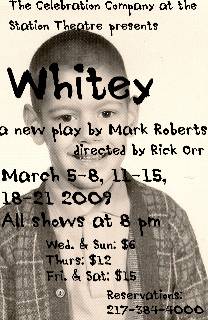 Can one spoil the already rotten? Consider yourself forewarned.
Can one spoil the already rotten? Consider yourself forewarned.
In the last few scenes of Whitey, playwright Mark Roberts manages to throw in anal rape for laughs, abortion, pedophilia, lesbianism, brother-sister incest, suicide by hanging, graphic murder by butcher knife and brick (the entire row in front of me averted their eyes), cannibalism (hmmm, what’s this bit of splattered brain taste like?), and a pulchritudinous female slowly climbing the stairs in her panties and flesh-colored bra. If that description doesn’t get you into The Station Theater, then nothing should.
Roberts wrote on his Facebook wall, “Ambition without talent is just greed. And small dogs always make me cry.”
That is either too deep philosophically or too abysmally shallow for me to comprehend. The same might be said for his non-redemptive, horrific new comedy which simultaneously panders to and mocks his paying audience.
Because Roberts made his mark as head writer and producer for the top-rated CBS sitcom, I did my research and watched half an episode of Two and a Half Men. Sample lines: “Only you could gay up dating two women.” “Why is there a pastie stuck to your testicle?” Sample situations: the two men are shown in alternating scenes, simultaneously in bed with sexy women, while their charge, the one-half man, a middle-school kid, is out getting drunk from a six-pack purchased for him by a wino named Satellite Jack. The kid pukes. Cue laugh track. The kid pukes again. Cue laugh track. The kid says “bat rasterd.” Repeat three times. Throws up again. One of the men returns to visit the woman he left unsatisfied, but she doesn’t want to see him now (since there’s another man in her bedroom), so she tasers him. He writhes on the floor, jerking in spasms. Cue laugh track and repeat three times to fade.
So this is where Roberts is coming from, as they say.
In his bid for theatrical respectability, Roberts provides the kind of gore that also propelled Shakespeare to write Titus Andronicus, perhaps. I suspect any allusions to that play or those of Sarah Kane or Joe Orton are entirely coincidental, but I could be wrong. Roberts himself speaks of his work in a disembodied sense, as though he had channeled the work from another planet. Another TV channel, perhaps.
For the publicity flier, he said, “It’s very, very out there. I haven’t really done anything in this vein before. Probably the symbolism and the stage imagery are the most unsettling aspects.”
Mike Trippiedi, playing the title character of an outspoken Kentucky hick, drags his limp foot down the stairs on the bi-level set a little inconsistently, but he is hypnotic and loud, like Roberts Blossom in a dirt road butcher shop, embodying a Jeepers Creepers horror movie in which all the characters are variations of the Gollum.
Whitey does everything repeatedly, clunking up and down the cellar stairs, impersonating a sick cow mooing, singing two verses of “Jesus Loves Me” at full volume, and reminiscing about his horrible life with a flashlight under his chin. This simple effect goes beyond creepy and into the nightmarish.
(Side note: That’s Trippiedi’s childhood picture in the poster.)
“Jesus Loves Me” is re-sung by methhead Tom (David Barkley) after he shoots up onstage with a dirty needle. Barkley, who spends the first half of the play responding to the Whitey’s regulations for living in his basement, bears stringy locks and a haunted gaze, his beefy frame twitching and scratching. He reminds one of the creepy evil spirit Bob from Twin Peaks. It made me itch just watching him.
As Trudy, Lindsey Markel is actually the voice of reason of this group, hoping to extricate herself from the life they are living. She counts to ten before acting out in anger, something her partner in crime might have tried before blowing the head off a teenage clerk at the convenience store they’ve just robbed. The couple have rented out the Whitey’s dank basement, trying to decide their future. She provides sex to passing truckers for money.
“We’re down to selling blood and our bodies,” she says.
In the first hour of the play, the biggest laughs (in a half-full house Sunday night) were for the tidal wave of adolescent cursing. Roberts doesn’t work too hard to come up with new ways to swear; he appends “stick,” “trap,” or “giggle” to the predictable four letter words.
“All you can do is give blow jobs, and you aren’t very good at that,” Tom berates Trudy.
“Well, you didn’t give me very much to work with,” Trudy replies.
The tension as to whether this qualifies as a comedy itself provides some diversion, but there is not a chance to consider this a serious play. The repeated jokes about the uncle who bashed his head falling down the stairs and then proceeded to call everyone “Dennis” got laughs only the first couple times.
“Come here (and let me molest you), Dennis,” Whitey recalls his uncle’s words. Cue rimshot.
There is no plot. There are only the situations. Oh, and the script manages to slip in references to “queer,” “nigger,” and “retard,” too, just to cover all the bases of offensiveness.
Where is the symbolism Roberts promised? Are these pathetic and horrible people supposed to be symbolic of Midwesterners like ourselves? Or the people who live on that long list of Kentucky towns that Whitey recites, the map of his circumscribed existence?
Roberts shows ample enthusiasm for working on the stage, but his efforts aren’t ready for prime time. If, when one character refers to another as having “achieved a whole new level of stupid,” Roberts is slyly holding up a mirror to the pups in his adoring and unsuspecting local audience, Whitey just may have a point after all. Cue rimshot.








